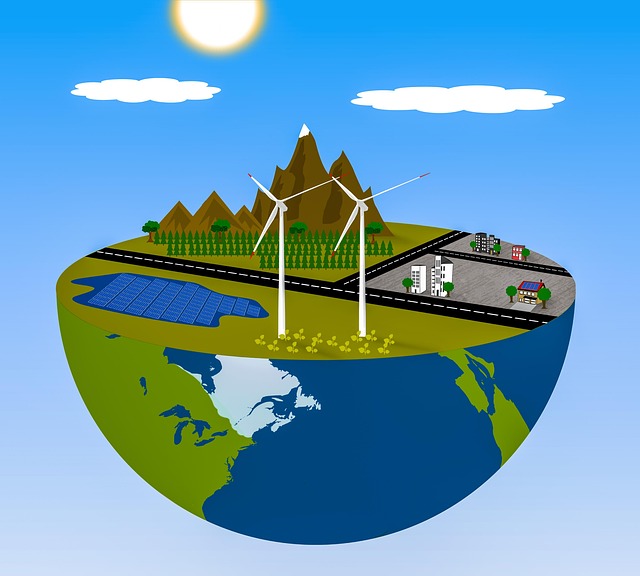
Seoul, South Korea – A significant milestone has been reached in South Korea's energy landscape as renewable energy sources, including wind and solar power, generated over 10% of the nation's electricity supply for the first time in 2024. According to the '2024 Energy Supply and Demand Trends' report released by the Ministry of Trade, Industry and Energy (MOTIE) on May 11th, renewable energy accounted for 10.6% (63.2 TWh) of the total electricity generation of 595.6 TWh, which saw a modest 1.3% increase from the previous year. This landmark achievement underscores the growing role of clean energy in South Korea's power mix, primarily driven by the expansion of solar power infrastructure and improvements in photovoltaic efficiency. The renewable energy sector witnessed an impressive 11.7% year-on-year growth in generation.
This progress in renewable energy comes at a pivotal time for South Korea's energy policy, which is navigating the complexities of transitioning towards a more sustainable and secure energy future. The government has set ambitious targets for increasing the share of renewable energy in its power generation portfolio as part of its commitment to combating climate change and reducing reliance on fossil fuels. However, this expansion necessitates significant upgrades and modernization of the country's existing power transmission and distribution network. Experts and industry stakeholders are increasingly emphasizing the critical need for proactive grid enhancements to accommodate the intermittent nature of renewable energy sources and ensure the stability and reliability of the electricity supply.
The MOTIE report also highlighted a notable shift in South Korea's primary power source. Nuclear power generation experienced a 4.6% increase from 2023, reaching 188.8 TWh and constituting 31.7% of the total electricity generated. This resurgence marks the first time since 2007, during the late Roh Moo-hyun administration, that nuclear power has claimed the top spot as the nation's largest electricity producer. This development reflects the current administration's policy of emphasizing nuclear energy as a key component of its energy security strategy and a means to reduce carbon emissions.
Consequently, coal-fired power, which had long held the position of the leading power source, has been relegated to third place, accounting for a smaller share of the generation mix. Natural gas-fired power occupied the second position, contributing 28.1% to the total electricity generation. This reshuffling of the power generation hierarchy underscores the dynamic shifts occurring within South Korea's energy sector as it adapts to evolving energy policies and global environmental imperatives.
Beyond electricity generation, the report also provided insights into South Korea's overall energy consumption. In 2024, the total energy consumed reached 309.4 million tons of oil equivalent (toe), representing a 1.7% increase compared to the previous year. Simultaneously, there was a marginal improvement in energy efficiency, as indicated by the energy intensity figure of 0.133 toe per million won, a 0.1% reduction from the year before. While a slight improvement, there is ongoing pressure and policy focus on further enhancing energy efficiency across various sectors of the South Korean economy.
The achievement of surpassing the 10% threshold for renewable energy generation is a significant step forward for South Korea. However, the integration of a larger proportion of variable renewable energy sources, such as solar and wind, presents considerable challenges for the existing power grid. These challenges include managing the intermittency of renewable energy supply, maintaining grid stability, and ensuring sufficient transmission capacity to transport electricity from often geographically dispersed renewable energy generation sites to demand centers.
Addressing these challenges requires substantial investment in grid modernization, including the deployment of smart grid technologies, energy storage solutions, and the expansion of transmission lines. Without these crucial upgrades, the full potential of renewable energy in South Korea could be constrained, and the reliability of the power supply could be jeopardized.
Furthermore, South Korea's energy transition is influenced by a complex interplay of factors, including energy security concerns, economic considerations, and public acceptance. The government's current energy policy reflects a balance between promoting renewable energy and maintaining a significant role for nuclear power. This approach has sparked debate among environmental groups and energy experts, with some advocating for a more rapid transition towards renewables and a phase-out of nuclear power, while others emphasize the importance of nuclear energy for baseload power and energy independence.
Looking ahead, South Korea faces the critical task of strategically planning its energy infrastructure to accommodate the increasing share of renewable energy while ensuring a stable, affordable, and environmentally sustainable energy supply. This will require a coordinated effort involving government agencies, energy companies, technology providers, and the public. Investing in research and development for advanced grid technologies, energy storage, and demand-side management will be crucial for enabling a seamless integration of renewables.
The milestone of 10% renewable energy generation marks a turning point for South Korea's energy sector. However, it is clear that significant challenges remain in realizing the full potential of clean energy. Prioritizing investments in grid modernization and fostering a comprehensive and long-term energy strategy will be essential for South Korea to successfully navigate its energy transition and secure a sustainable energy future. The coming years will be critical in determining how effectively South Korea can address the infrastructural and policy hurdles associated with integrating a growing share of renewable energy into its power system.
[Copyright (c) Global Economic Times. All Rights Reserved.]



























